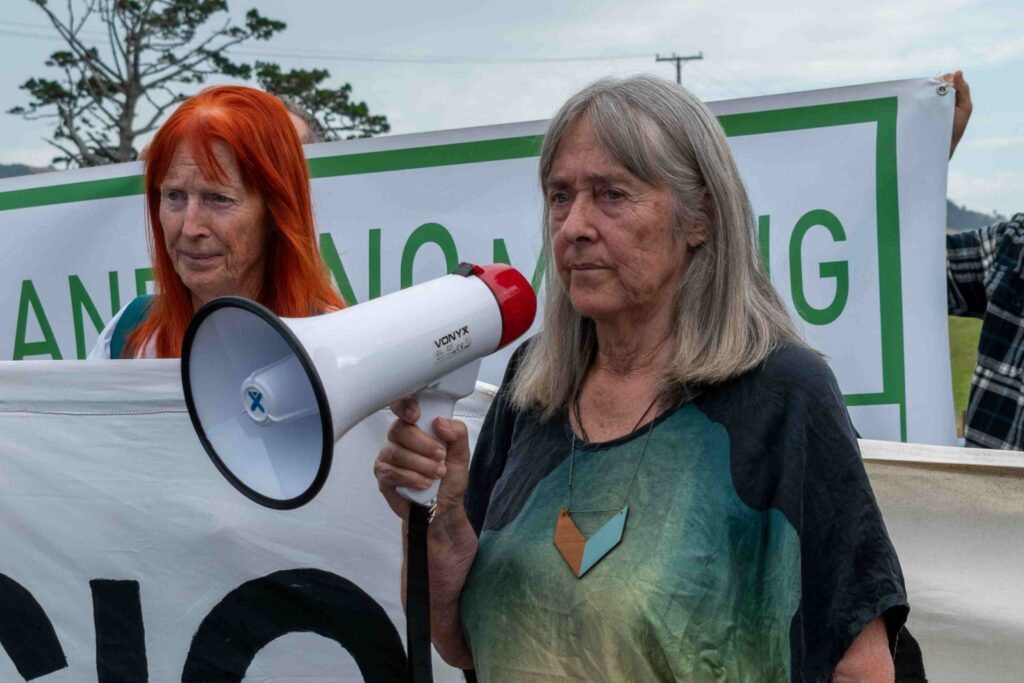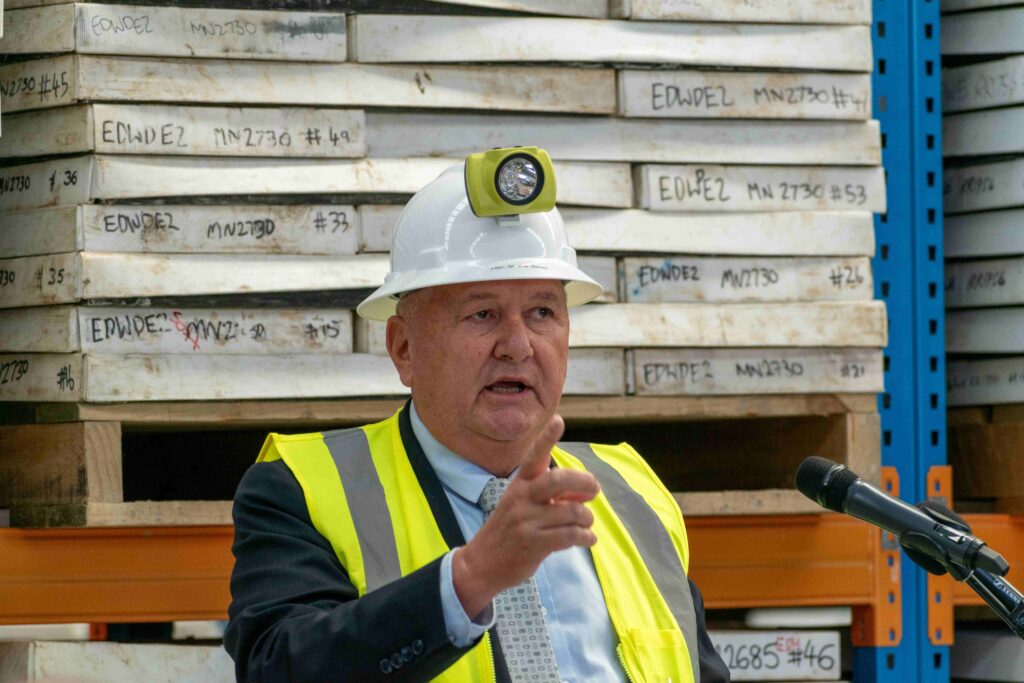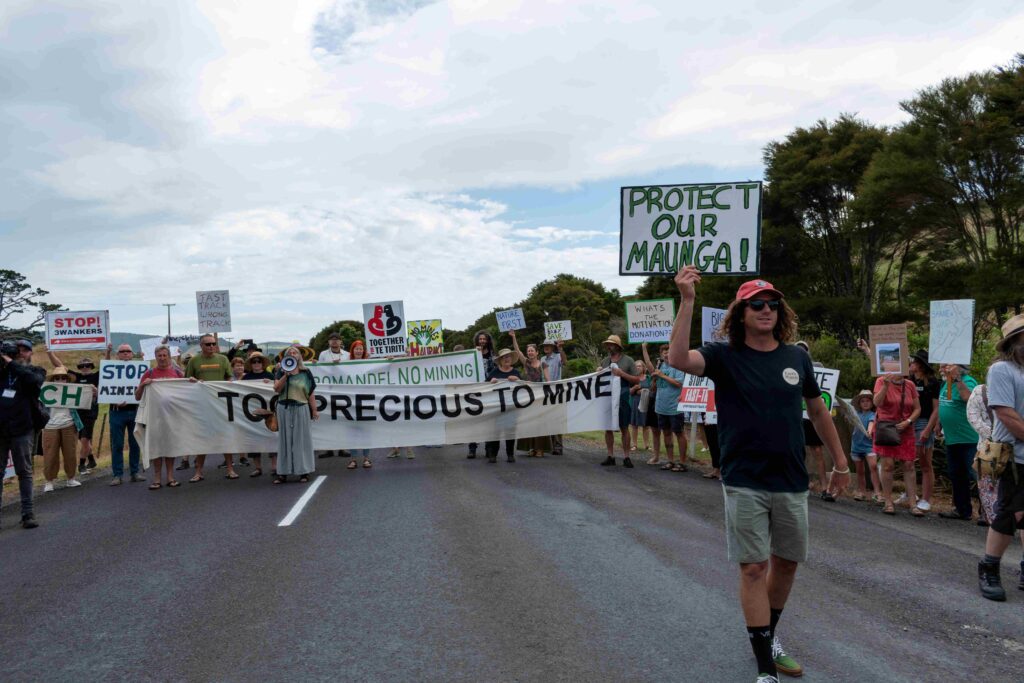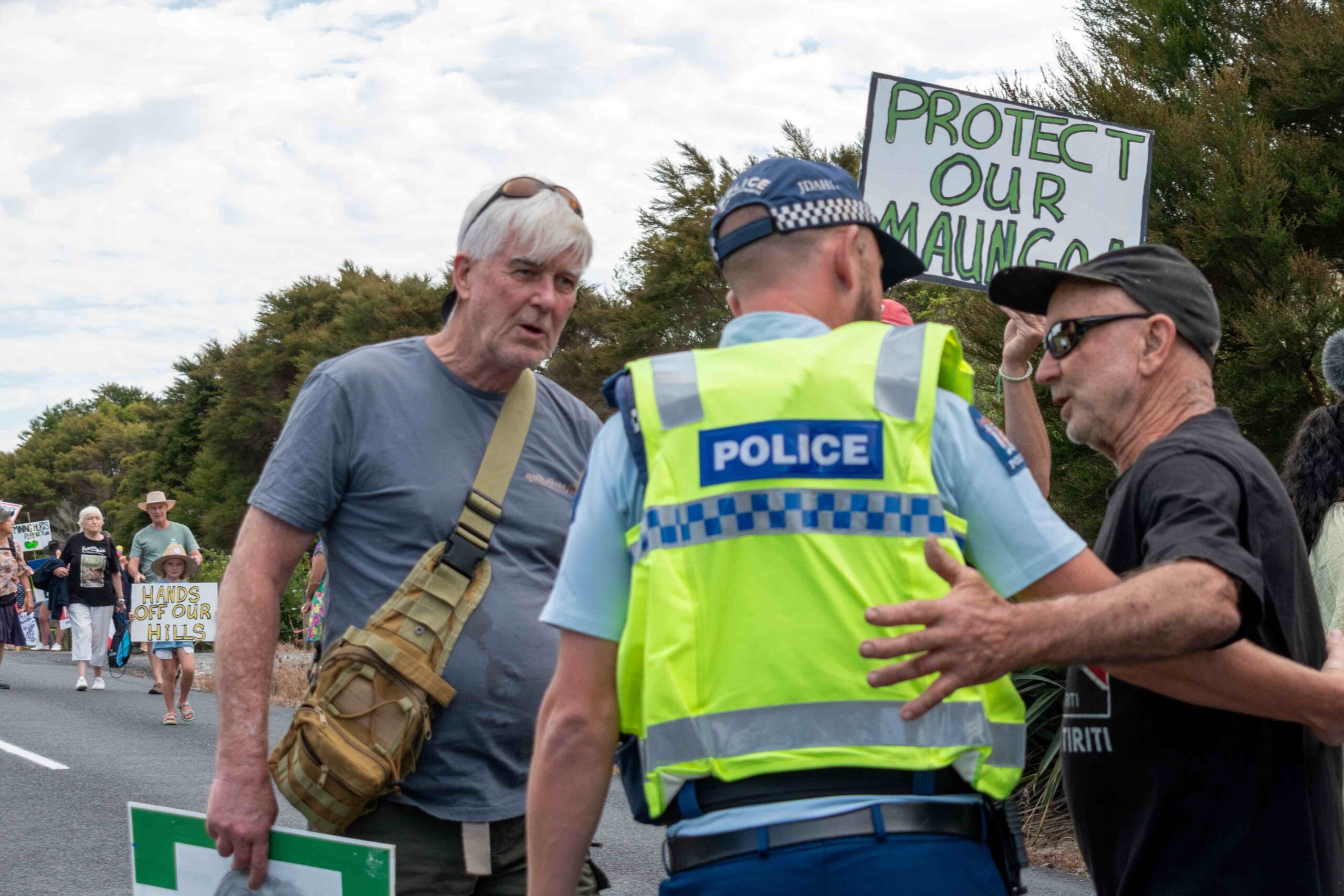Protest action saw a government announcement delayed in Waihī on January 31, as members of Coromandel Watchdog and Forest & Bird formed a human roadblock outside Oceana Gold’s Baxter Rd entrance.
However, Resources Minister Shane Jones still managed to debut the government’s new national mining strategy in a lengthy speech filled with inflammatory rhetoric.
The Minister was in Waihī to unveil the strategy, which aims to double New Zealand’s mining export profit to $3 billion by 2035. He also released a list of 37 critical minerals deemed essential to New Zealand’s economy and technological needs.
The announcement, which was scheduled for 10am, was delayed due to the protestors. They blocked the Baxter Rd entrance to the property – brandishing signs, chanting slogans, and calling for the Minister to front up publicly.
Two buses carrying invited dignitaries and media were forced to turn away from the mine’s entrance, and further delays were caused as some protestors were forcibly removed from behind the reversing vehicles.

Coromandel Watchdog chair Catherine Delahunty said she was pleased with the protest, saying it gave her hope for the future.
“It was a wonderful turnout, very much from all over the peninsula, and there were some Waihī people which is always quite brave on their part,” she said.
“We succeeded in what we wanted to do, which was to delay things and to show our presence and our strength. And everybody was here because they care about this place, and they’re willing to give up a day and stand in the heat. They’re willing to be called names and willing to be disparaged. But they actually have the bigger picture.”
The buses eventually detoured through the streets of Waihī and entered the mining property through another entrance. Minister Jones addressed mining staff and the invited guests a short while later at a warehouse within the premises.

Minister Jones’ speech introduced the new national mineral strategy, containing a roadmap outlining the Ministry of Business, Innovation and Employment’s plan for the country’s mining industry as far ahead as 2040.
Key takeaways of the strategy included: doubling New Zealand’s mining export profit; creating up to 2000 additional regional jobs across the country; a vision of a productive, innovative and responsible mining industry which reduces the country’s reliance on imported minerals; better public awareness of the mining industry; and more foreign investment.
“The minerals sector can occupy a far more prominent position in the narrative of our nation,” Minister Jones said.
“It’s about time we had a debate as to where the pendulum should sit between green ideology and the need to grow our economy.”

The Minister’s call for a calm national discussion about mining was somewhat at odds with his delivery, however, as he used phrases like “climate groupthink”, “woke-collar sponges” and “bureaucratic camouflage” to describe various environmental groups, and policies like the Resource Management Act.
Minister Jones also used his speech as an opportunity to expand on the government’s already well-publicised intention to remove red tape and other barriers in favour of economic advancement. He announced NZ First’s intention to rein in banks with a member’s bill, calling them “woke-riddled, corporate undertakers” and suggesting they should not be using environment- or climate-related policies to constrain economic development.
“If we want economic growth in New Zealand, we have got to have a profound discussion as to what percentage of the green tape, what percentage of the climate regulation can we actually afford.”
There were nods and murmurs of approval throughout the warehouse as the Minister spoke, with one mining staff member muttering “what a legend” at the conclusion of his speech.
Not everyone in the audience was happy, however, and Oceana Gold’s senior vice-president of legal and public affairs Alison Paul was interrupted partway through her speech by a mana whenua woman.
“You all sit amongst the rocks of our tūpuna and say we should allow this… 1.6 million ounces of gold has been taken out of the mountain – it is not in the coffers of Hauraki iwi. It is not on the streets of the community. It has gone offshore,” she said.
The Minister was quick to shut down her protests. He later told reporters his party was working on a policy ensuring more mining royalties remained in communities.

The Minister also spoke about the environment, and said the mining strategy outlines the Government’s intentions to continue to honour Te Tiriti o Waitangi and protect the environment within mining operations. He called it a “considered, enduring approach to minerals development”, saying it would still enable responsible, sustainable practices within the industry.
“The Crown will uphold its obligations in Treaty settlements… We will engage with the community and ensure that the guardrails are such that regions will not be blighted by the growth of the industry. But we are not going to be guilt-tripped,” the Minister said.
Catherine Delahunty, who was disappointed the Minister would not speak publicly, said the strategy represented the anti-mining agency’s worst fears about the government’s approach to mining, and called it a “failure of leadership”. She said the strategy would lead to greater environmental risks and less public scrutiny.
“The Minerals Strategy exists in the context of several really bad pieces of law. One is the Fast Track and the other is the Treaty Principles Bill… Both of them limit and attack the rights of Māori and the rights of citizens to be heard and to put forward our questions on these issues. And people are outraged about that,” she said.
“Now [Oceana Gold has] opted for the Fast Track, no one gets a voice except a panel of government-appointed experts and the ministers. The minerals strategy cannot say we are going to be credible and responsible regulators when in fact they are actually stripping us of our rights through other legislation.”
The strategy’s mention of the environment was “tokenistic” at best, and increasing mineral production was not worth the risk, she said.
“There is a tone there that minerals are going to be our economic saviour… It’s not a huge part of the economy.”
Minister Jones, however, said the nation needed to focus on “turn[ing] the fortunes of our country around”.
“It’s too easy for it to generate into a predictable, polarised debate: save the lizard, hate the pollution. We cannot afford such a binary, simplistic polarisation,” he said.
“We have to seize every opportunity, within guardrails, to use nature’s bounty.”





